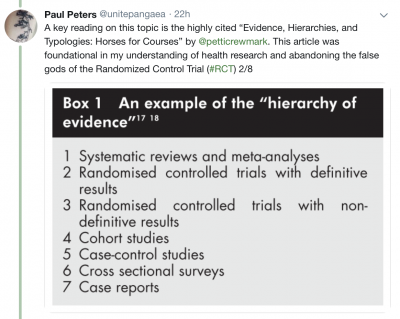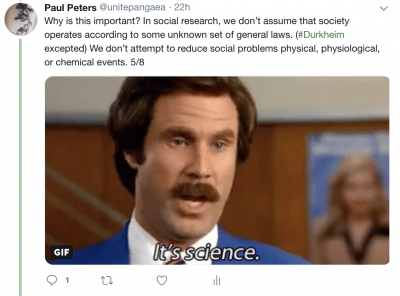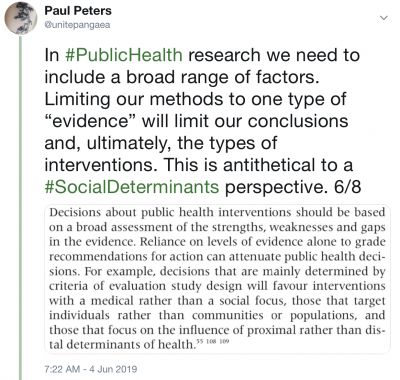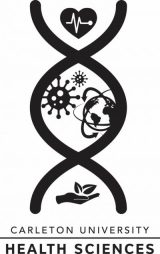Hierarchies of Evidence
The approach to health research in Carleton Health Sciences is multi-disciplinary. While this descriptor is oft-used in higher education I think it’s very apt for our Department. We are a small group who together manage a growing suite of programs that provide training at the undergraduate, professional, and post-graduate levels. Our expertise is incredibly varied and includes genetics, virology, developmental endocrinology as well as social psychology, community health, and data analytics.
To make this work we have adopted a perspective that recognises multiple ways of ‘knowing’ and doing science. Some of our work is in ‘wet labs’ while other work is within communities and with individuals. Sometimes this works, and sometimes we get pushback from outside where others might not understand the nature of health research.

To respond to this I created a short Twitter thread on the “hierarchies of evidence” based on the foundational work of Marc Petticrew and Helen Roberts, Evidence, Hierarchies, and Typologies: Horses for Courses.

The fundamental premise of this work is that the method one employs in health research is dependent on what question is being asked.

One wouldn’t run a survey when asking “how innate immune responses are regulated by metabolic programming?” Conversely, one wouldn’t set up a randomized control trial when asking “What physician recruitment and retention strategies have been effective in rural Canada?”

This goes back to the fundamentals of science. Early social science theory was heavily influenced by the physical sciences and was highly positivist (see Durkheim).

However, we have transitioned to recognising that society doesn’t operate by a set of definable rules, where there is one ‘right’ answer to social problems.

In health research, we recognise that much of what we do interacts on multiple levels. There is not one way of knowing about health, health systems, or public health.


Back to our Department and what we’re attempting. I feel that we are a truly unique addition to the Canadian health education landscape. We provide a foundational Bachelor’s of Health Sciences where students are provided in-depth, advanced learning and hands-on research experiences in health sciences, from the social, biomedical and environmental determinants of health perspectives. We augment that with a course-based graduate program that considers health across the science, technology, and policy domains. In addition, we have a growing cohort of research-based graduate students in our MSc and PhD programs.
It comes down to a matter of perspective though. We are firmly grounded in the philosophy that a multidisciplinary and integrative approach is necessary to understand and address health issues.